Effective Communication, Negotiation, and Influence Skills Report
VerifiedAdded on 2021/02/20
|11
|2590
|26
Report
AI Summary
This report delves into personal and professional skills crucial for management, focusing on effective communication, negotiation, and influencing skills. The report is structured around a reflective logbook detailing a five-week group discussion. Week 1 introduces communication fundamentals, types, and characteristics, while Week 2 examines the positive and negative impacts of communication on workplace behavior. Week 3 explores negotiation and influencing skills, their importance, and definitions. Week 4 analyzes the application of negotiation skills in achieving objectives, and Week 5 focuses on how different influencing skills are used to reach predetermined goals. The report provides a comprehensive overview of these essential skills, offering insights into their practical application and significance in a professional setting. The author discusses the importance of these skills in a workplace environment, and their role in achieving individual and organizational objectives.
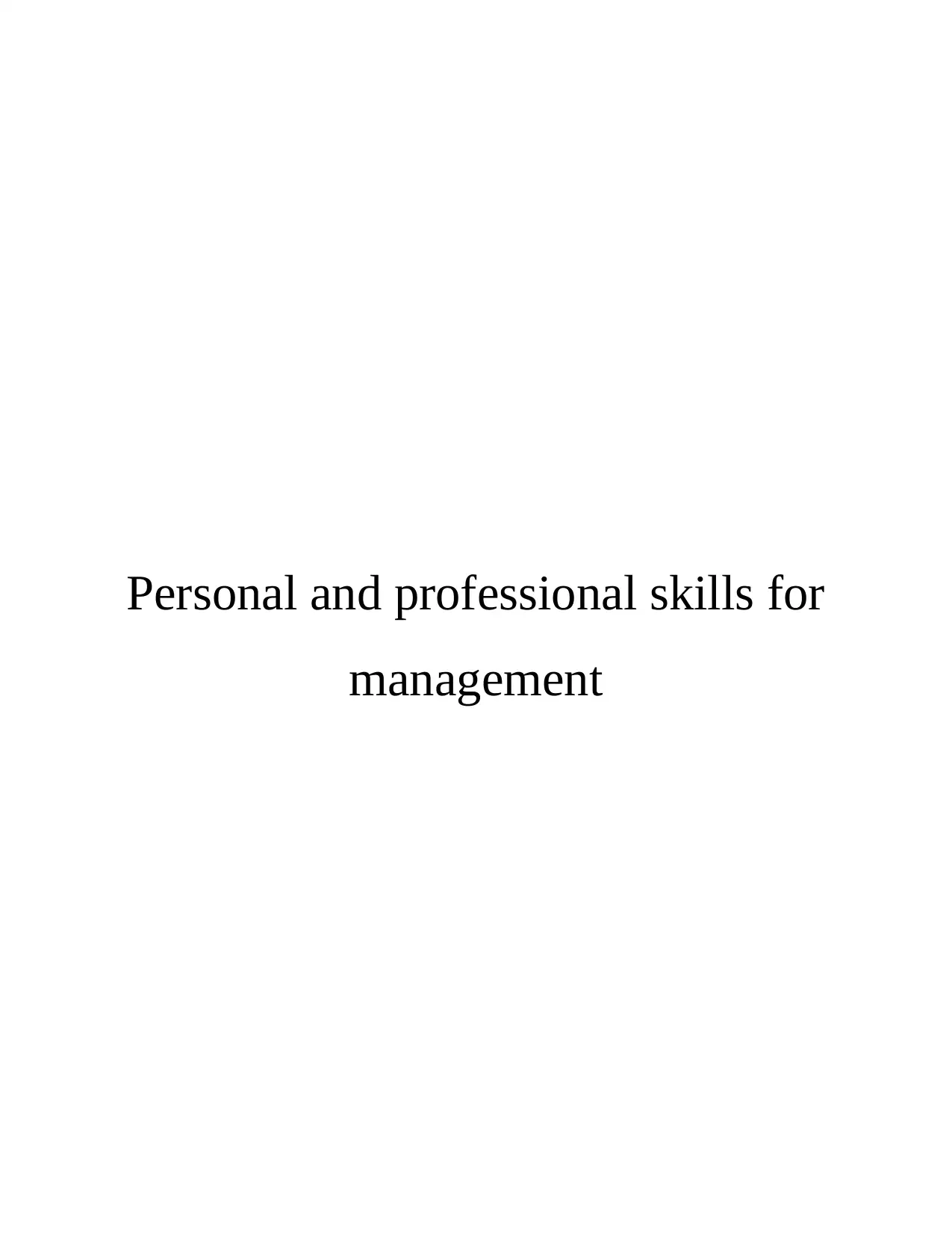
Personal and professional skills for
management
management
Paraphrase This Document
Need a fresh take? Get an instant paraphrase of this document with our AI Paraphraser
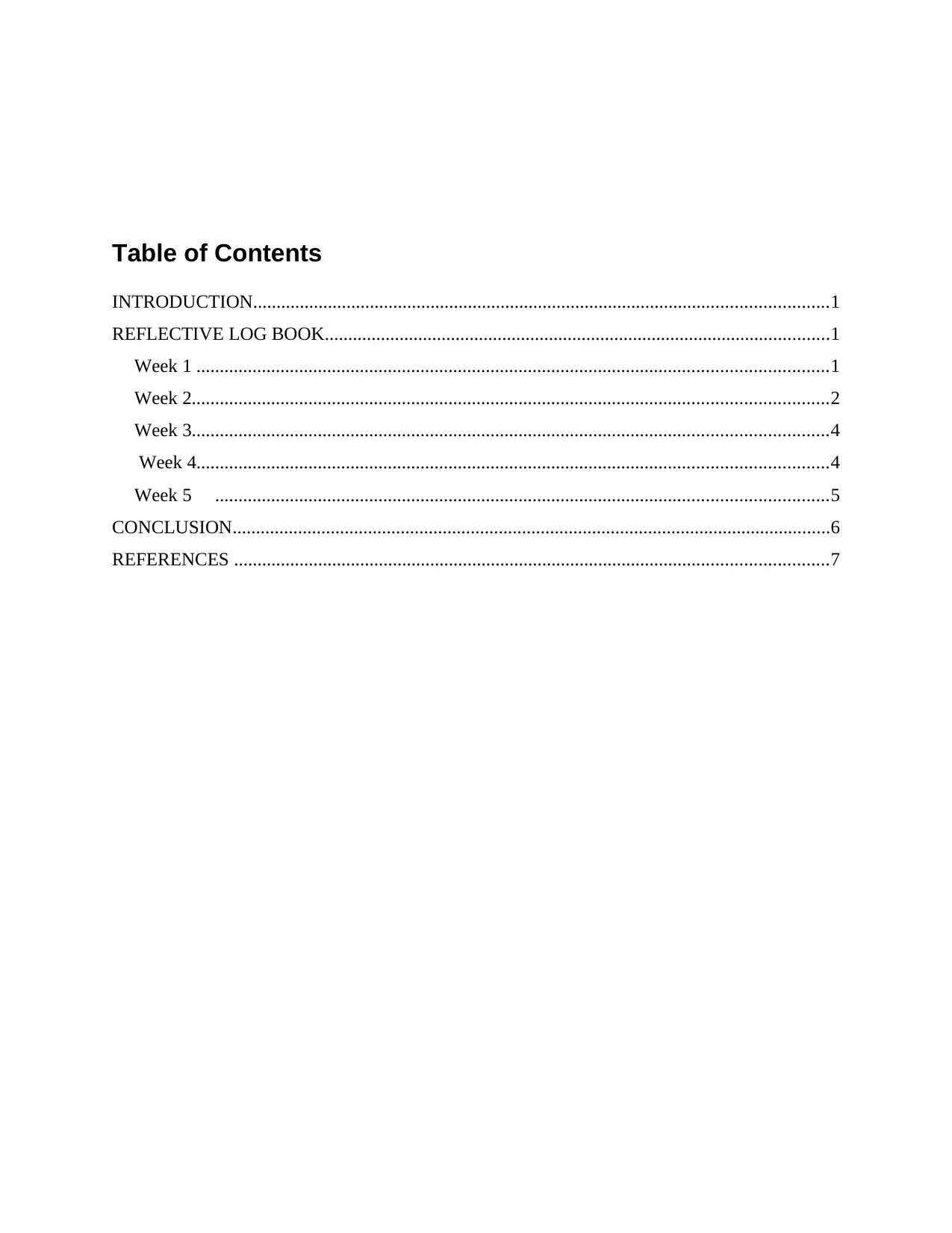
Table of Contents
INTRODUCTION...........................................................................................................................1
REFLECTIVE LOG BOOK............................................................................................................1
Week 1 .......................................................................................................................................1
Week 2........................................................................................................................................2
Week 3........................................................................................................................................4
Week 4.......................................................................................................................................4
Week 5 ...................................................................................................................................5
CONCLUSION................................................................................................................................6
REFERENCES ...............................................................................................................................7
INTRODUCTION...........................................................................................................................1
REFLECTIVE LOG BOOK............................................................................................................1
Week 1 .......................................................................................................................................1
Week 2........................................................................................................................................2
Week 3........................................................................................................................................4
Week 4.......................................................................................................................................4
Week 5 ...................................................................................................................................5
CONCLUSION................................................................................................................................6
REFERENCES ...............................................................................................................................7
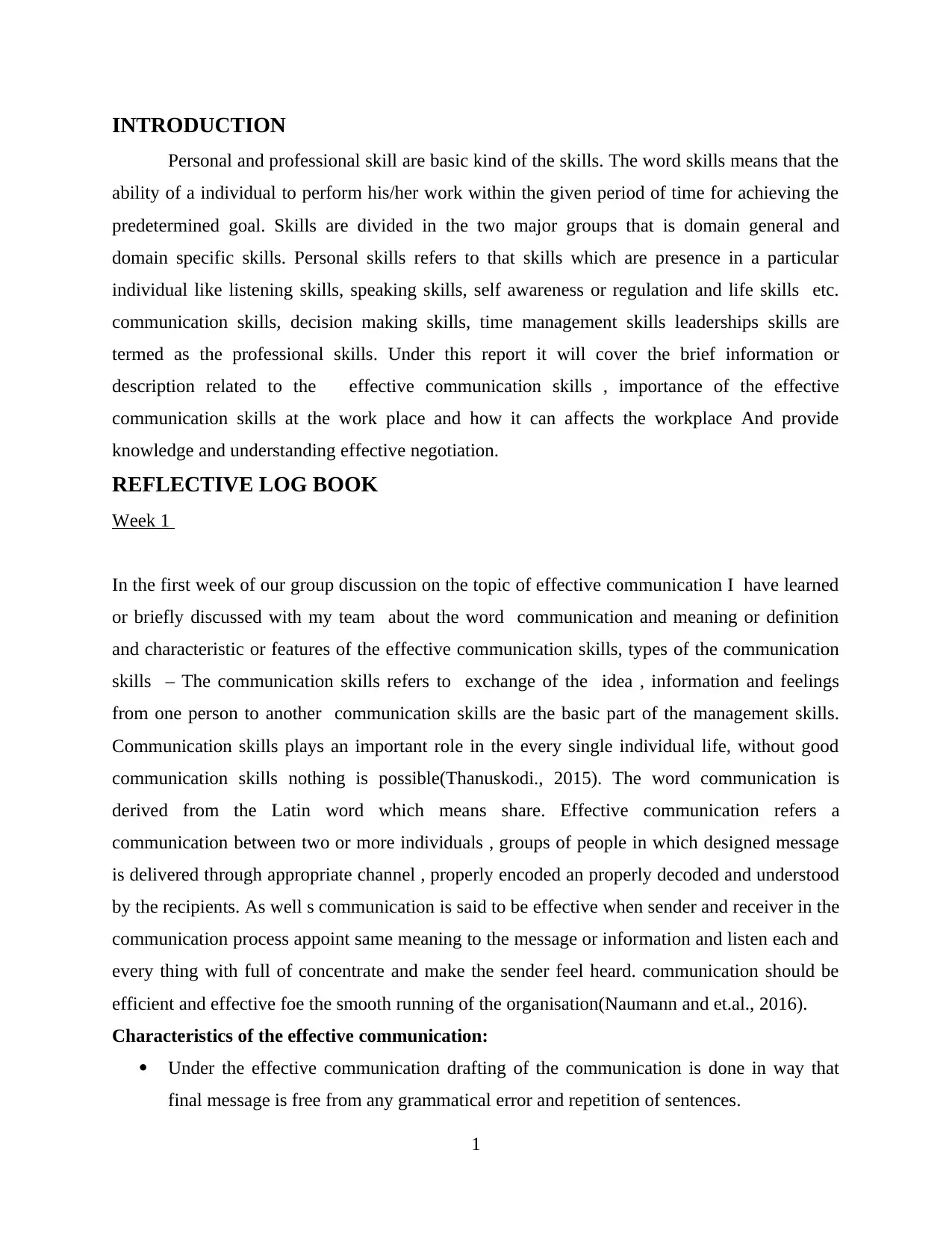
INTRODUCTION
Personal and professional skill are basic kind of the skills. The word skills means that the
ability of a individual to perform his/her work within the given period of time for achieving the
predetermined goal. Skills are divided in the two major groups that is domain general and
domain specific skills. Personal skills refers to that skills which are presence in a particular
individual like listening skills, speaking skills, self awareness or regulation and life skills etc.
communication skills, decision making skills, time management skills leaderships skills are
termed as the professional skills. Under this report it will cover the brief information or
description related to the effective communication skills , importance of the effective
communication skills at the work place and how it can affects the workplace And provide
knowledge and understanding effective negotiation.
REFLECTIVE LOG BOOK
Week 1
In the first week of our group discussion on the topic of effective communication I have learned
or briefly discussed with my team about the word communication and meaning or definition
and characteristic or features of the effective communication skills, types of the communication
skills – The communication skills refers to exchange of the idea , information and feelings
from one person to another communication skills are the basic part of the management skills.
Communication skills plays an important role in the every single individual life, without good
communication skills nothing is possible(Thanuskodi., 2015). The word communication is
derived from the Latin word which means share. Effective communication refers a
communication between two or more individuals , groups of people in which designed message
is delivered through appropriate channel , properly encoded an properly decoded and understood
by the recipients. As well s communication is said to be effective when sender and receiver in the
communication process appoint same meaning to the message or information and listen each and
every thing with full of concentrate and make the sender feel heard. communication should be
efficient and effective foe the smooth running of the organisation(Naumann and et.al., 2016).
Characteristics of the effective communication:
Under the effective communication drafting of the communication is done in way that
final message is free from any grammatical error and repetition of sentences.
1
Personal and professional skill are basic kind of the skills. The word skills means that the
ability of a individual to perform his/her work within the given period of time for achieving the
predetermined goal. Skills are divided in the two major groups that is domain general and
domain specific skills. Personal skills refers to that skills which are presence in a particular
individual like listening skills, speaking skills, self awareness or regulation and life skills etc.
communication skills, decision making skills, time management skills leaderships skills are
termed as the professional skills. Under this report it will cover the brief information or
description related to the effective communication skills , importance of the effective
communication skills at the work place and how it can affects the workplace And provide
knowledge and understanding effective negotiation.
REFLECTIVE LOG BOOK
Week 1
In the first week of our group discussion on the topic of effective communication I have learned
or briefly discussed with my team about the word communication and meaning or definition
and characteristic or features of the effective communication skills, types of the communication
skills – The communication skills refers to exchange of the idea , information and feelings
from one person to another communication skills are the basic part of the management skills.
Communication skills plays an important role in the every single individual life, without good
communication skills nothing is possible(Thanuskodi., 2015). The word communication is
derived from the Latin word which means share. Effective communication refers a
communication between two or more individuals , groups of people in which designed message
is delivered through appropriate channel , properly encoded an properly decoded and understood
by the recipients. As well s communication is said to be effective when sender and receiver in the
communication process appoint same meaning to the message or information and listen each and
every thing with full of concentrate and make the sender feel heard. communication should be
efficient and effective foe the smooth running of the organisation(Naumann and et.al., 2016).
Characteristics of the effective communication:
Under the effective communication drafting of the communication is done in way that
final message is free from any grammatical error and repetition of sentences.
1
⊘ This is a preview!⊘
Do you want full access?
Subscribe today to unlock all pages.

Trusted by 1+ million students worldwide
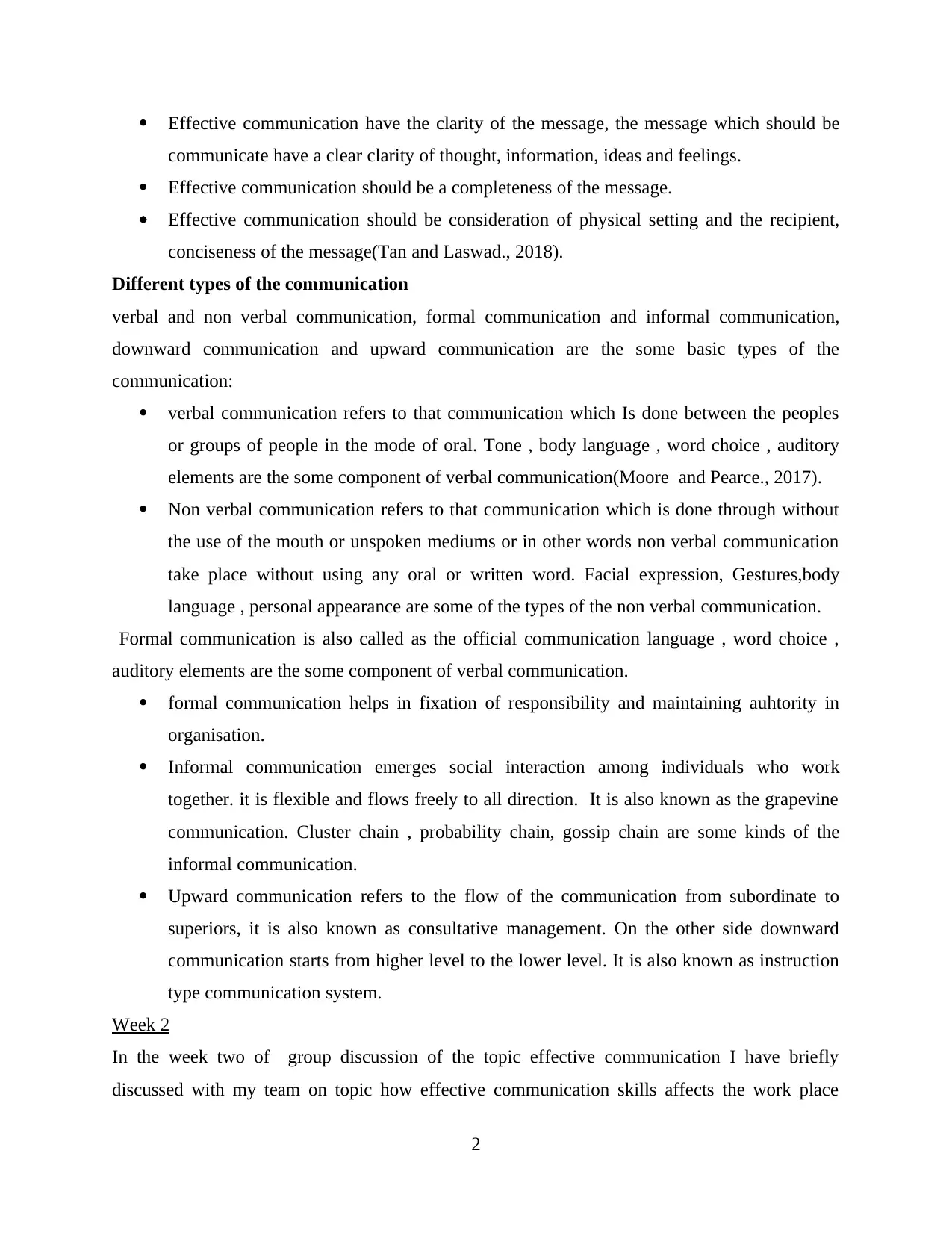
Effective communication have the clarity of the message, the message which should be
communicate have a clear clarity of thought, information, ideas and feelings.
Effective communication should be a completeness of the message.
Effective communication should be consideration of physical setting and the recipient,
conciseness of the message(Tan and Laswad., 2018).
Different types of the communication
verbal and non verbal communication, formal communication and informal communication,
downward communication and upward communication are the some basic types of the
communication:
verbal communication refers to that communication which Is done between the peoples
or groups of people in the mode of oral. Tone , body language , word choice , auditory
elements are the some component of verbal communication(Moore and Pearce., 2017).
Non verbal communication refers to that communication which is done through without
the use of the mouth or unspoken mediums or in other words non verbal communication
take place without using any oral or written word. Facial expression, Gestures,body
language , personal appearance are some of the types of the non verbal communication.
Formal communication is also called as the official communication language , word choice ,
auditory elements are the some component of verbal communication.
formal communication helps in fixation of responsibility and maintaining auhtority in
organisation.
Informal communication emerges social interaction among individuals who work
together. it is flexible and flows freely to all direction. It is also known as the grapevine
communication. Cluster chain , probability chain, gossip chain are some kinds of the
informal communication.
Upward communication refers to the flow of the communication from subordinate to
superiors, it is also known as consultative management. On the other side downward
communication starts from higher level to the lower level. It is also known as instruction
type communication system.
Week 2
In the week two of group discussion of the topic effective communication I have briefly
discussed with my team on topic how effective communication skills affects the work place
2
communicate have a clear clarity of thought, information, ideas and feelings.
Effective communication should be a completeness of the message.
Effective communication should be consideration of physical setting and the recipient,
conciseness of the message(Tan and Laswad., 2018).
Different types of the communication
verbal and non verbal communication, formal communication and informal communication,
downward communication and upward communication are the some basic types of the
communication:
verbal communication refers to that communication which Is done between the peoples
or groups of people in the mode of oral. Tone , body language , word choice , auditory
elements are the some component of verbal communication(Moore and Pearce., 2017).
Non verbal communication refers to that communication which is done through without
the use of the mouth or unspoken mediums or in other words non verbal communication
take place without using any oral or written word. Facial expression, Gestures,body
language , personal appearance are some of the types of the non verbal communication.
Formal communication is also called as the official communication language , word choice ,
auditory elements are the some component of verbal communication.
formal communication helps in fixation of responsibility and maintaining auhtority in
organisation.
Informal communication emerges social interaction among individuals who work
together. it is flexible and flows freely to all direction. It is also known as the grapevine
communication. Cluster chain , probability chain, gossip chain are some kinds of the
informal communication.
Upward communication refers to the flow of the communication from subordinate to
superiors, it is also known as consultative management. On the other side downward
communication starts from higher level to the lower level. It is also known as instruction
type communication system.
Week 2
In the week two of group discussion of the topic effective communication I have briefly
discussed with my team on topic how effective communication skills affects the work place
2
Paraphrase This Document
Need a fresh take? Get an instant paraphrase of this document with our AI Paraphraser
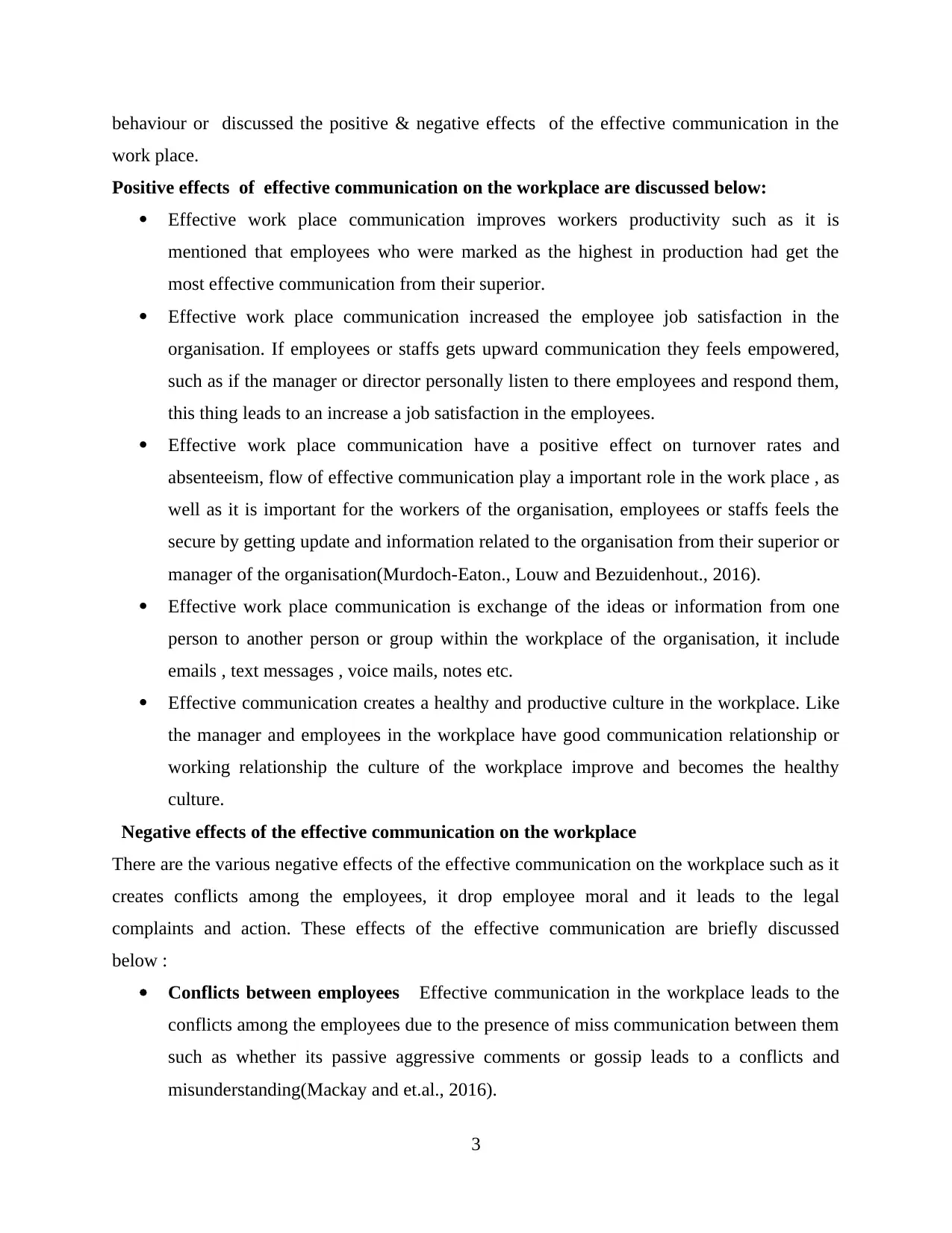
behaviour or discussed the positive & negative effects of the effective communication in the
work place.
Positive effects of effective communication on the workplace are discussed below:
Effective work place communication improves workers productivity such as it is
mentioned that employees who were marked as the highest in production had get the
most effective communication from their superior.
Effective work place communication increased the employee job satisfaction in the
organisation. If employees or staffs gets upward communication they feels empowered,
such as if the manager or director personally listen to there employees and respond them,
this thing leads to an increase a job satisfaction in the employees.
Effective work place communication have a positive effect on turnover rates and
absenteeism, flow of effective communication play a important role in the work place , as
well as it is important for the workers of the organisation, employees or staffs feels the
secure by getting update and information related to the organisation from their superior or
manager of the organisation(Murdoch-Eaton., Louw and Bezuidenhout., 2016).
Effective work place communication is exchange of the ideas or information from one
person to another person or group within the workplace of the organisation, it include
emails , text messages , voice mails, notes etc.
Effective communication creates a healthy and productive culture in the workplace. Like
the manager and employees in the workplace have good communication relationship or
working relationship the culture of the workplace improve and becomes the healthy
culture.
Negative effects of the effective communication on the workplace
There are the various negative effects of the effective communication on the workplace such as it
creates conflicts among the employees, it drop employee moral and it leads to the legal
complaints and action. These effects of the effective communication are briefly discussed
below :
Conflicts between employees Effective communication in the workplace leads to the
conflicts among the employees due to the presence of miss communication between them
such as whether its passive aggressive comments or gossip leads to a conflicts and
misunderstanding(Mackay and et.al., 2016).
3
work place.
Positive effects of effective communication on the workplace are discussed below:
Effective work place communication improves workers productivity such as it is
mentioned that employees who were marked as the highest in production had get the
most effective communication from their superior.
Effective work place communication increased the employee job satisfaction in the
organisation. If employees or staffs gets upward communication they feels empowered,
such as if the manager or director personally listen to there employees and respond them,
this thing leads to an increase a job satisfaction in the employees.
Effective work place communication have a positive effect on turnover rates and
absenteeism, flow of effective communication play a important role in the work place , as
well as it is important for the workers of the organisation, employees or staffs feels the
secure by getting update and information related to the organisation from their superior or
manager of the organisation(Murdoch-Eaton., Louw and Bezuidenhout., 2016).
Effective work place communication is exchange of the ideas or information from one
person to another person or group within the workplace of the organisation, it include
emails , text messages , voice mails, notes etc.
Effective communication creates a healthy and productive culture in the workplace. Like
the manager and employees in the workplace have good communication relationship or
working relationship the culture of the workplace improve and becomes the healthy
culture.
Negative effects of the effective communication on the workplace
There are the various negative effects of the effective communication on the workplace such as it
creates conflicts among the employees, it drop employee moral and it leads to the legal
complaints and action. These effects of the effective communication are briefly discussed
below :
Conflicts between employees Effective communication in the workplace leads to the
conflicts among the employees due to the presence of miss communication between them
such as whether its passive aggressive comments or gossip leads to a conflicts and
misunderstanding(Mackay and et.al., 2016).
3
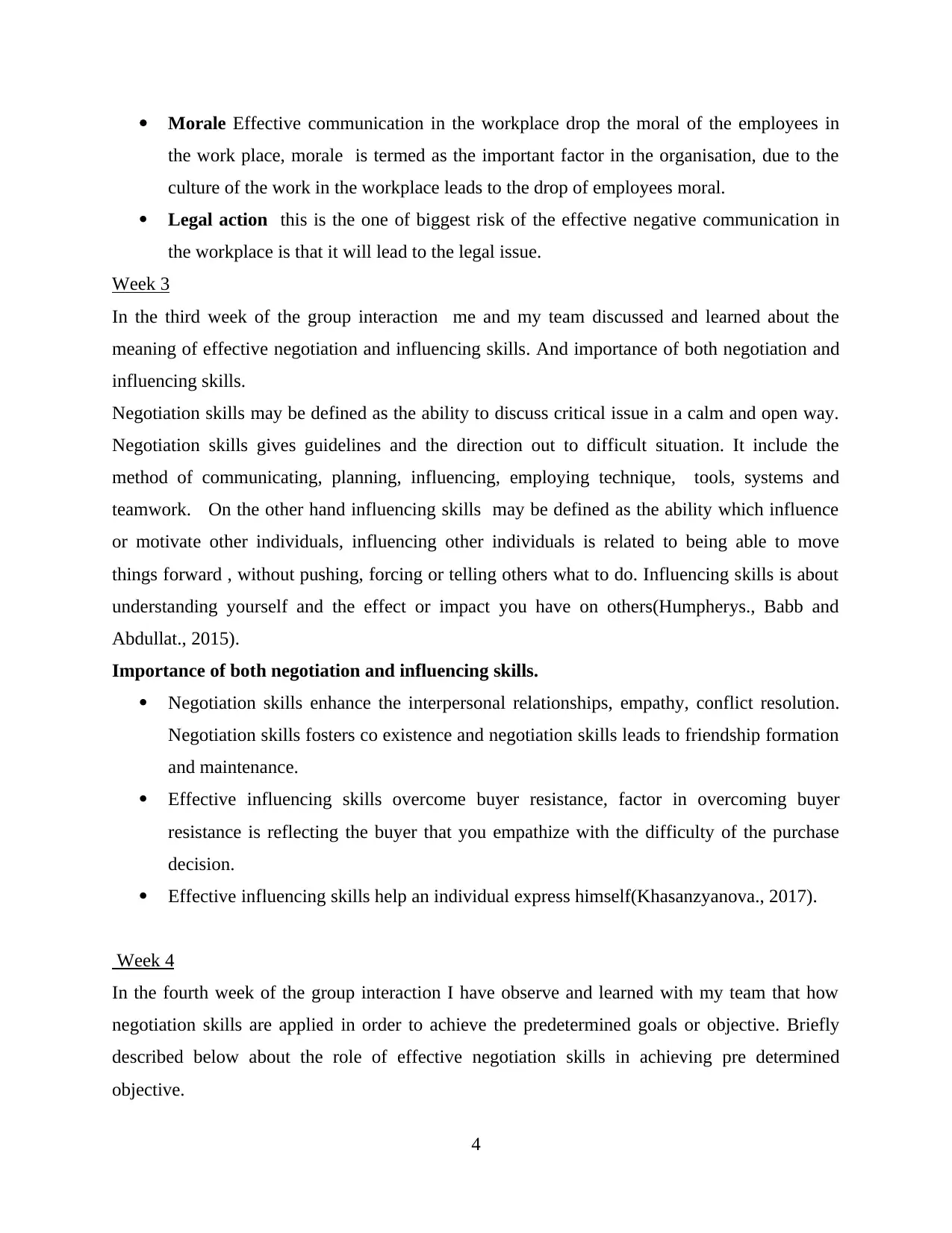
Morale Effective communication in the workplace drop the moral of the employees in
the work place, morale is termed as the important factor in the organisation, due to the
culture of the work in the workplace leads to the drop of employees moral.
Legal action this is the one of biggest risk of the effective negative communication in
the workplace is that it will lead to the legal issue.
Week 3
In the third week of the group interaction me and my team discussed and learned about the
meaning of effective negotiation and influencing skills. And importance of both negotiation and
influencing skills.
Negotiation skills may be defined as the ability to discuss critical issue in a calm and open way.
Negotiation skills gives guidelines and the direction out to difficult situation. It include the
method of communicating, planning, influencing, employing technique, tools, systems and
teamwork. On the other hand influencing skills may be defined as the ability which influence
or motivate other individuals, influencing other individuals is related to being able to move
things forward , without pushing, forcing or telling others what to do. Influencing skills is about
understanding yourself and the effect or impact you have on others(Humpherys., Babb and
Abdullat., 2015).
Importance of both negotiation and influencing skills.
Negotiation skills enhance the interpersonal relationships, empathy, conflict resolution.
Negotiation skills fosters co existence and negotiation skills leads to friendship formation
and maintenance.
Effective influencing skills overcome buyer resistance, factor in overcoming buyer
resistance is reflecting the buyer that you empathize with the difficulty of the purchase
decision.
Effective influencing skills help an individual express himself(Khasanzyanova., 2017).
Week 4
In the fourth week of the group interaction I have observe and learned with my team that how
negotiation skills are applied in order to achieve the predetermined goals or objective. Briefly
described below about the role of effective negotiation skills in achieving pre determined
objective.
4
the work place, morale is termed as the important factor in the organisation, due to the
culture of the work in the workplace leads to the drop of employees moral.
Legal action this is the one of biggest risk of the effective negative communication in
the workplace is that it will lead to the legal issue.
Week 3
In the third week of the group interaction me and my team discussed and learned about the
meaning of effective negotiation and influencing skills. And importance of both negotiation and
influencing skills.
Negotiation skills may be defined as the ability to discuss critical issue in a calm and open way.
Negotiation skills gives guidelines and the direction out to difficult situation. It include the
method of communicating, planning, influencing, employing technique, tools, systems and
teamwork. On the other hand influencing skills may be defined as the ability which influence
or motivate other individuals, influencing other individuals is related to being able to move
things forward , without pushing, forcing or telling others what to do. Influencing skills is about
understanding yourself and the effect or impact you have on others(Humpherys., Babb and
Abdullat., 2015).
Importance of both negotiation and influencing skills.
Negotiation skills enhance the interpersonal relationships, empathy, conflict resolution.
Negotiation skills fosters co existence and negotiation skills leads to friendship formation
and maintenance.
Effective influencing skills overcome buyer resistance, factor in overcoming buyer
resistance is reflecting the buyer that you empathize with the difficulty of the purchase
decision.
Effective influencing skills help an individual express himself(Khasanzyanova., 2017).
Week 4
In the fourth week of the group interaction I have observe and learned with my team that how
negotiation skills are applied in order to achieve the predetermined goals or objective. Briefly
described below about the role of effective negotiation skills in achieving pre determined
objective.
4
⊘ This is a preview!⊘
Do you want full access?
Subscribe today to unlock all pages.

Trusted by 1+ million students worldwide
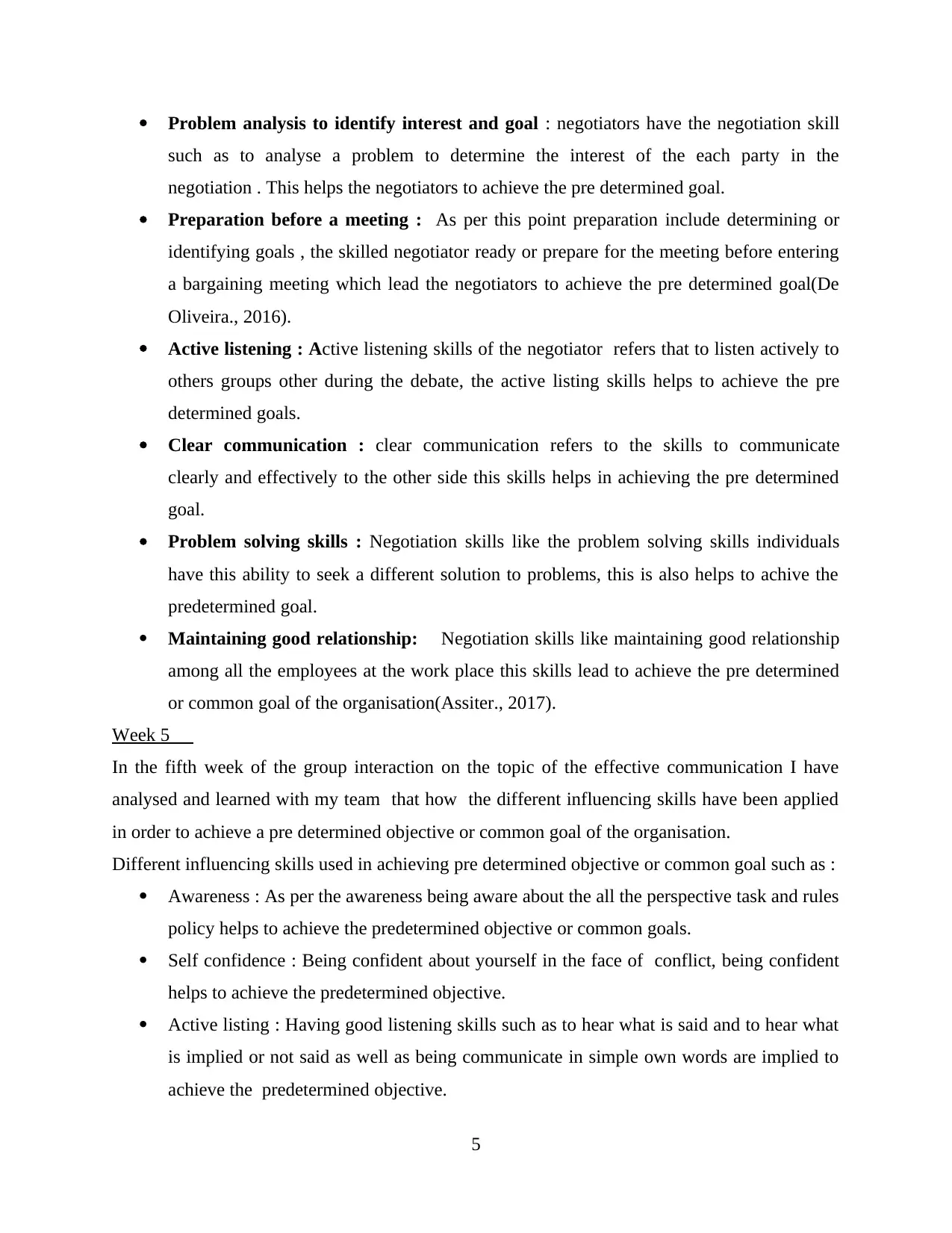
Problem analysis to identify interest and goal : negotiators have the negotiation skill
such as to analyse a problem to determine the interest of the each party in the
negotiation . This helps the negotiators to achieve the pre determined goal.
Preparation before a meeting : As per this point preparation include determining or
identifying goals , the skilled negotiator ready or prepare for the meeting before entering
a bargaining meeting which lead the negotiators to achieve the pre determined goal(De
Oliveira., 2016).
Active listening : Active listening skills of the negotiator refers that to listen actively to
others groups other during the debate, the active listing skills helps to achieve the pre
determined goals.
Clear communication : clear communication refers to the skills to communicate
clearly and effectively to the other side this skills helps in achieving the pre determined
goal.
Problem solving skills : Negotiation skills like the problem solving skills individuals
have this ability to seek a different solution to problems, this is also helps to achive the
predetermined goal.
Maintaining good relationship: Negotiation skills like maintaining good relationship
among all the employees at the work place this skills lead to achieve the pre determined
or common goal of the organisation(Assiter., 2017).
Week 5
In the fifth week of the group interaction on the topic of the effective communication I have
analysed and learned with my team that how the different influencing skills have been applied
in order to achieve a pre determined objective or common goal of the organisation.
Different influencing skills used in achieving pre determined objective or common goal such as :
Awareness : As per the awareness being aware about the all the perspective task and rules
policy helps to achieve the predetermined objective or common goals.
Self confidence : Being confident about yourself in the face of conflict, being confident
helps to achieve the predetermined objective.
Active listing : Having good listening skills such as to hear what is said and to hear what
is implied or not said as well as being communicate in simple own words are implied to
achieve the predetermined objective.
5
such as to analyse a problem to determine the interest of the each party in the
negotiation . This helps the negotiators to achieve the pre determined goal.
Preparation before a meeting : As per this point preparation include determining or
identifying goals , the skilled negotiator ready or prepare for the meeting before entering
a bargaining meeting which lead the negotiators to achieve the pre determined goal(De
Oliveira., 2016).
Active listening : Active listening skills of the negotiator refers that to listen actively to
others groups other during the debate, the active listing skills helps to achieve the pre
determined goals.
Clear communication : clear communication refers to the skills to communicate
clearly and effectively to the other side this skills helps in achieving the pre determined
goal.
Problem solving skills : Negotiation skills like the problem solving skills individuals
have this ability to seek a different solution to problems, this is also helps to achive the
predetermined goal.
Maintaining good relationship: Negotiation skills like maintaining good relationship
among all the employees at the work place this skills lead to achieve the pre determined
or common goal of the organisation(Assiter., 2017).
Week 5
In the fifth week of the group interaction on the topic of the effective communication I have
analysed and learned with my team that how the different influencing skills have been applied
in order to achieve a pre determined objective or common goal of the organisation.
Different influencing skills used in achieving pre determined objective or common goal such as :
Awareness : As per the awareness being aware about the all the perspective task and rules
policy helps to achieve the predetermined objective or common goals.
Self confidence : Being confident about yourself in the face of conflict, being confident
helps to achieve the predetermined objective.
Active listing : Having good listening skills such as to hear what is said and to hear what
is implied or not said as well as being communicate in simple own words are implied to
achieve the predetermined objective.
5
Paraphrase This Document
Need a fresh take? Get an instant paraphrase of this document with our AI Paraphraser
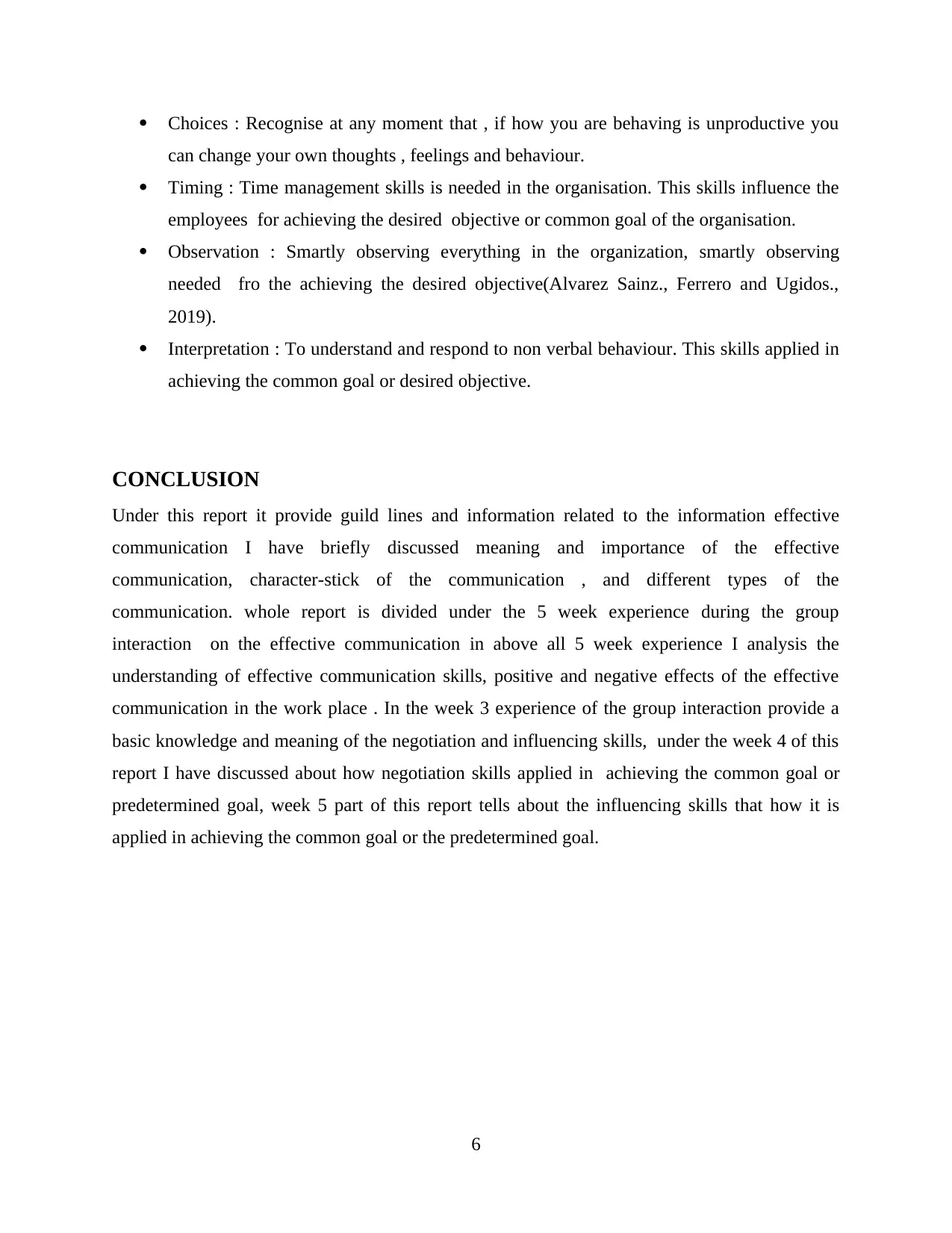
Choices : Recognise at any moment that , if how you are behaving is unproductive you
can change your own thoughts , feelings and behaviour.
Timing : Time management skills is needed in the organisation. This skills influence the
employees for achieving the desired objective or common goal of the organisation.
Observation : Smartly observing everything in the organization, smartly observing
needed fro the achieving the desired objective(Alvarez Sainz., Ferrero and Ugidos.,
2019).
Interpretation : To understand and respond to non verbal behaviour. This skills applied in
achieving the common goal or desired objective.
CONCLUSION
Under this report it provide guild lines and information related to the information effective
communication I have briefly discussed meaning and importance of the effective
communication, character-stick of the communication , and different types of the
communication. whole report is divided under the 5 week experience during the group
interaction on the effective communication in above all 5 week experience I analysis the
understanding of effective communication skills, positive and negative effects of the effective
communication in the work place . In the week 3 experience of the group interaction provide a
basic knowledge and meaning of the negotiation and influencing skills, under the week 4 of this
report I have discussed about how negotiation skills applied in achieving the common goal or
predetermined goal, week 5 part of this report tells about the influencing skills that how it is
applied in achieving the common goal or the predetermined goal.
6
can change your own thoughts , feelings and behaviour.
Timing : Time management skills is needed in the organisation. This skills influence the
employees for achieving the desired objective or common goal of the organisation.
Observation : Smartly observing everything in the organization, smartly observing
needed fro the achieving the desired objective(Alvarez Sainz., Ferrero and Ugidos.,
2019).
Interpretation : To understand and respond to non verbal behaviour. This skills applied in
achieving the common goal or desired objective.
CONCLUSION
Under this report it provide guild lines and information related to the information effective
communication I have briefly discussed meaning and importance of the effective
communication, character-stick of the communication , and different types of the
communication. whole report is divided under the 5 week experience during the group
interaction on the effective communication in above all 5 week experience I analysis the
understanding of effective communication skills, positive and negative effects of the effective
communication in the work place . In the week 3 experience of the group interaction provide a
basic knowledge and meaning of the negotiation and influencing skills, under the week 4 of this
report I have discussed about how negotiation skills applied in achieving the common goal or
predetermined goal, week 5 part of this report tells about the influencing skills that how it is
applied in achieving the common goal or the predetermined goal.
6
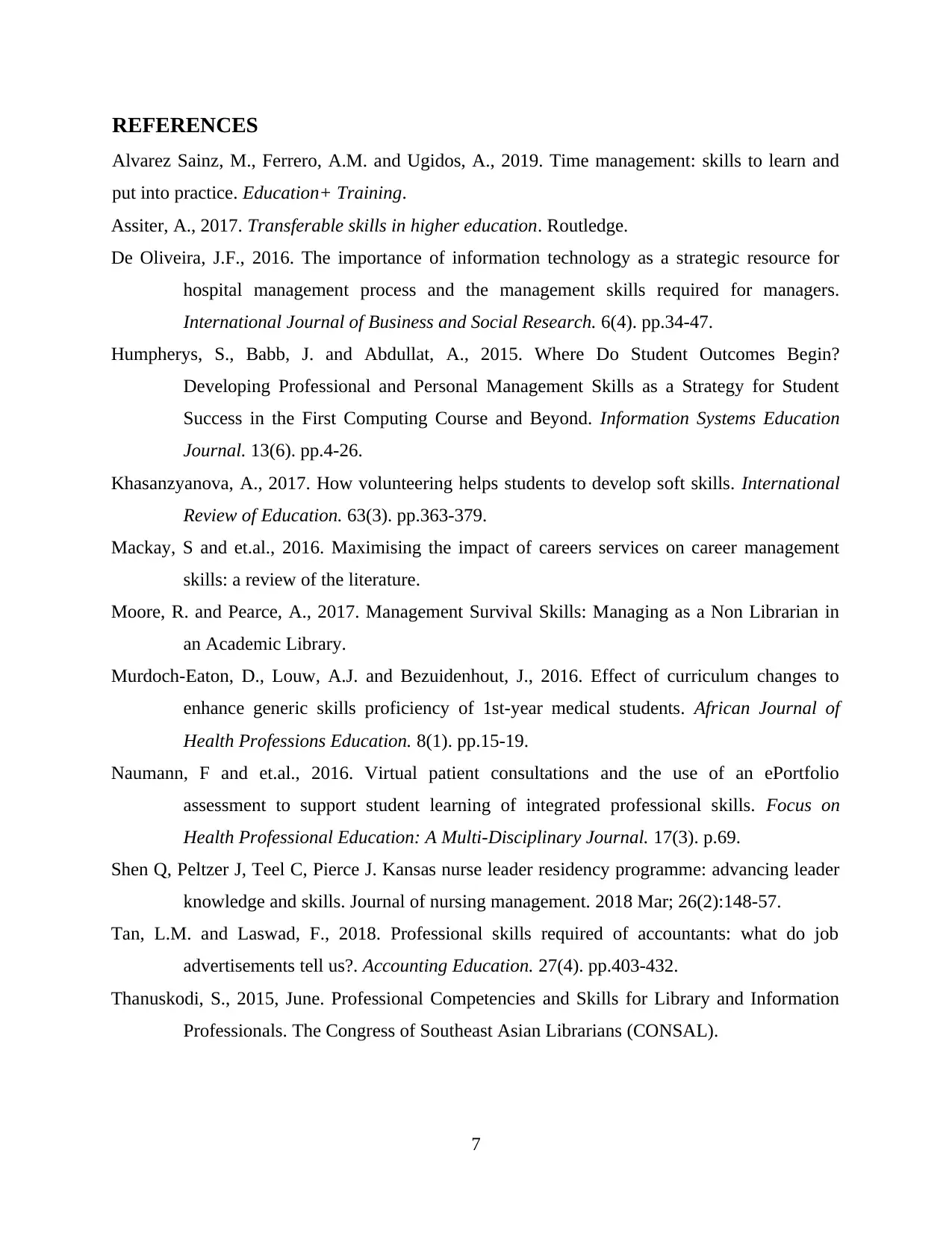
REFERENCES
Alvarez Sainz, M., Ferrero, A.M. and Ugidos, A., 2019. Time management: skills to learn and
put into practice. Education+ Training.
Assiter, A., 2017. Transferable skills in higher education. Routledge.
De Oliveira, J.F., 2016. The importance of information technology as a strategic resource for
hospital management process and the management skills required for managers.
International Journal of Business and Social Research. 6(4). pp.34-47.
Humpherys, S., Babb, J. and Abdullat, A., 2015. Where Do Student Outcomes Begin?
Developing Professional and Personal Management Skills as a Strategy for Student
Success in the First Computing Course and Beyond. Information Systems Education
Journal. 13(6). pp.4-26.
Khasanzyanova, A., 2017. How volunteering helps students to develop soft skills. International
Review of Education. 63(3). pp.363-379.
Mackay, S and et.al., 2016. Maximising the impact of careers services on career management
skills: a review of the literature.
Moore, R. and Pearce, A., 2017. Management Survival Skills: Managing as a Non Librarian in
an Academic Library.
Murdoch-Eaton, D., Louw, A.J. and Bezuidenhout, J., 2016. Effect of curriculum changes to
enhance generic skills proficiency of 1st-year medical students. African Journal of
Health Professions Education. 8(1). pp.15-19.
Naumann, F and et.al., 2016. Virtual patient consultations and the use of an ePortfolio
assessment to support student learning of integrated professional skills. Focus on
Health Professional Education: A Multi-Disciplinary Journal. 17(3). p.69.
Shen Q, Peltzer J, Teel C, Pierce J. Kansas nurse leader residency programme: advancing leader
knowledge and skills. Journal of nursing management. 2018 Mar; 26(2):148-57.
Tan, L.M. and Laswad, F., 2018. Professional skills required of accountants: what do job
advertisements tell us?. Accounting Education. 27(4). pp.403-432.
Thanuskodi, S., 2015, June. Professional Competencies and Skills for Library and Information
Professionals. The Congress of Southeast Asian Librarians (CONSAL).
7
Alvarez Sainz, M., Ferrero, A.M. and Ugidos, A., 2019. Time management: skills to learn and
put into practice. Education+ Training.
Assiter, A., 2017. Transferable skills in higher education. Routledge.
De Oliveira, J.F., 2016. The importance of information technology as a strategic resource for
hospital management process and the management skills required for managers.
International Journal of Business and Social Research. 6(4). pp.34-47.
Humpherys, S., Babb, J. and Abdullat, A., 2015. Where Do Student Outcomes Begin?
Developing Professional and Personal Management Skills as a Strategy for Student
Success in the First Computing Course and Beyond. Information Systems Education
Journal. 13(6). pp.4-26.
Khasanzyanova, A., 2017. How volunteering helps students to develop soft skills. International
Review of Education. 63(3). pp.363-379.
Mackay, S and et.al., 2016. Maximising the impact of careers services on career management
skills: a review of the literature.
Moore, R. and Pearce, A., 2017. Management Survival Skills: Managing as a Non Librarian in
an Academic Library.
Murdoch-Eaton, D., Louw, A.J. and Bezuidenhout, J., 2016. Effect of curriculum changes to
enhance generic skills proficiency of 1st-year medical students. African Journal of
Health Professions Education. 8(1). pp.15-19.
Naumann, F and et.al., 2016. Virtual patient consultations and the use of an ePortfolio
assessment to support student learning of integrated professional skills. Focus on
Health Professional Education: A Multi-Disciplinary Journal. 17(3). p.69.
Shen Q, Peltzer J, Teel C, Pierce J. Kansas nurse leader residency programme: advancing leader
knowledge and skills. Journal of nursing management. 2018 Mar; 26(2):148-57.
Tan, L.M. and Laswad, F., 2018. Professional skills required of accountants: what do job
advertisements tell us?. Accounting Education. 27(4). pp.403-432.
Thanuskodi, S., 2015, June. Professional Competencies and Skills for Library and Information
Professionals. The Congress of Southeast Asian Librarians (CONSAL).
7
⊘ This is a preview!⊘
Do you want full access?
Subscribe today to unlock all pages.

Trusted by 1+ million students worldwide

8
Paraphrase This Document
Need a fresh take? Get an instant paraphrase of this document with our AI Paraphraser

9
1 out of 11
Related Documents
Your All-in-One AI-Powered Toolkit for Academic Success.
+13062052269
info@desklib.com
Available 24*7 on WhatsApp / Email
![[object Object]](/_next/static/media/star-bottom.7253800d.svg)
Unlock your academic potential
Copyright © 2020–2026 A2Z Services. All Rights Reserved. Developed and managed by ZUCOL.



